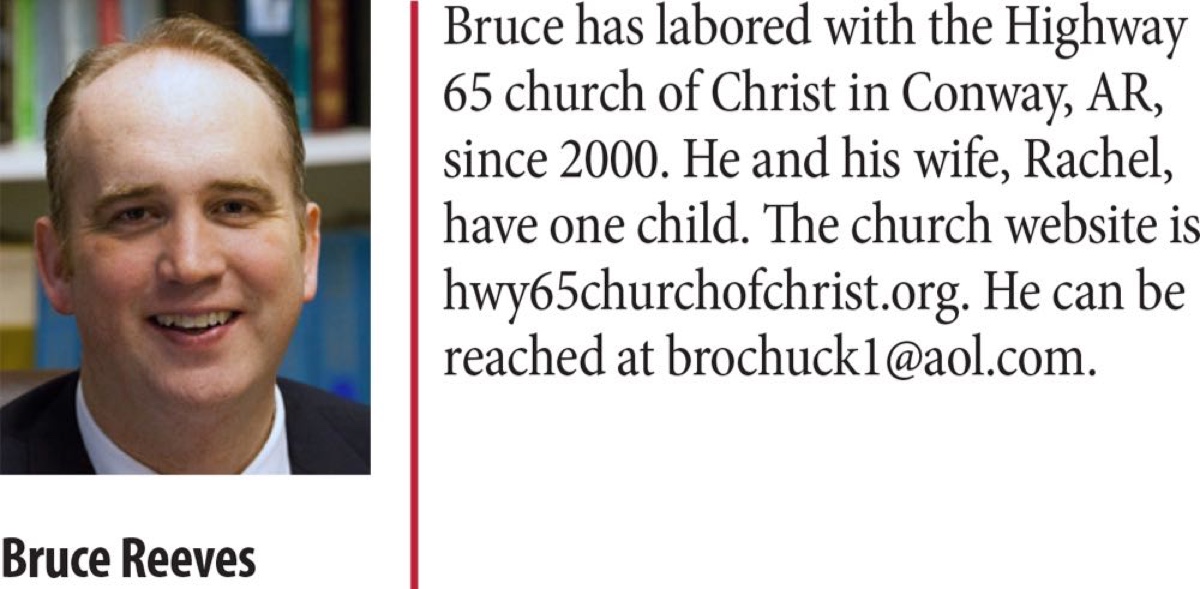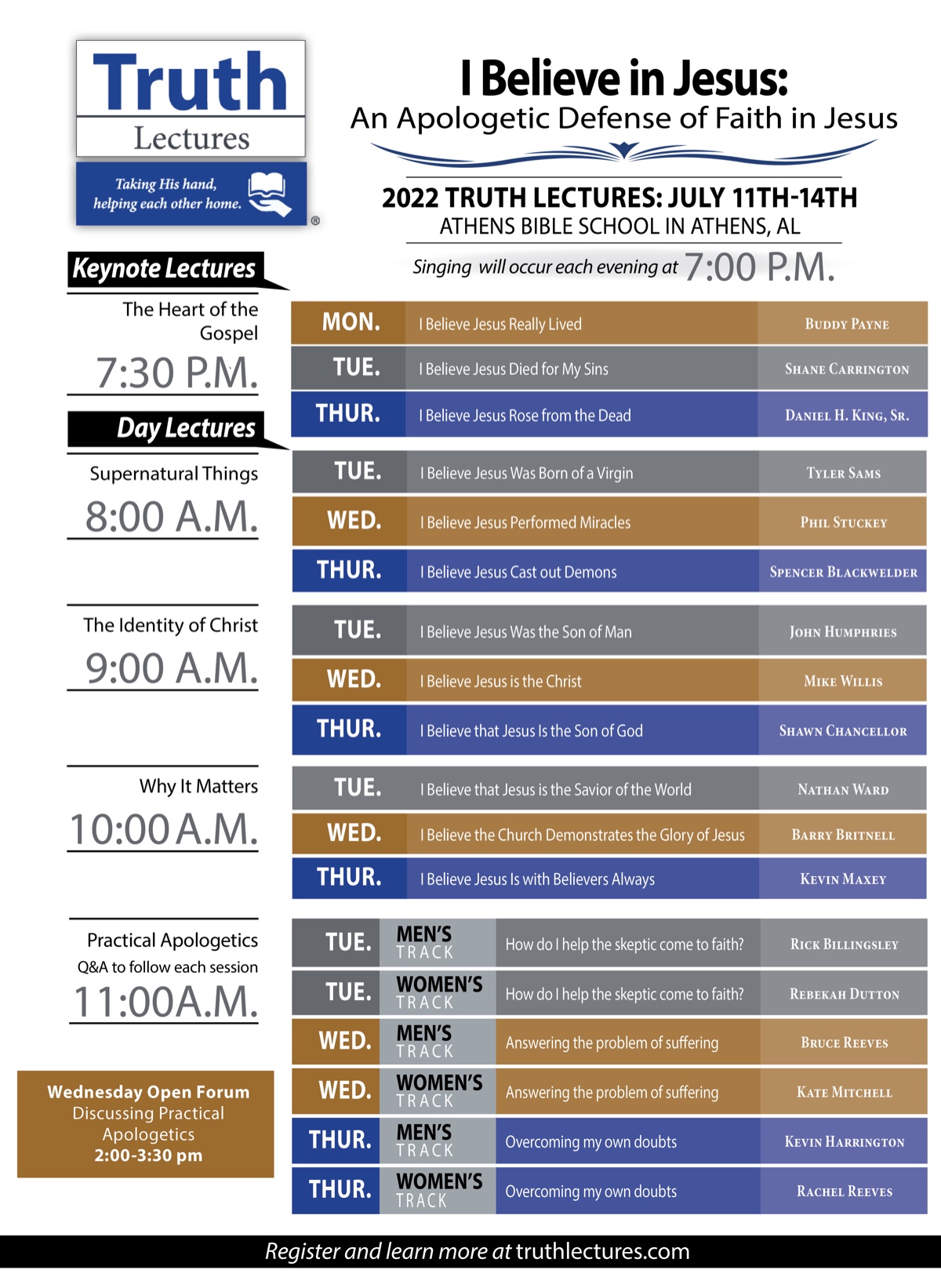By Bruce Reeves
Synopsis: The Bible affirms that man is a creature of choice, while Calvinism alleges that humanity is totally depraved. These foundational positions reflect radically different views of man and God.
What we believe about the nature of God and humanity has practical consequences in our lives, relationships, and our view of sharing the gospel of Christ with the lost. Can we proclaim that Jesus died for everyone (John 3:16), that salvation is available to the whole world (Matt. 11:28-30; Mark 16:15), and that the gospel is for all (Heb. 5:8-9; Rev. 22:17)? If we believe the gospel, “Yes!” In contrast with these scriptural affirmations, Calvinism not only asserts that specific individuals were chosen unconditionally from eternity for either salvation or damnation, but also teaches that every person is born totally depraved and unable to choose faith in Christ. What a contrast!
We are not denying that mankind is guilty of sin (Rom. 3:23) or that we need God’s grace for salvation (Rom. 3:9-28; Eph. 2:8-9). The real issue at hand can be seen in the following questions:
“Have we inherited a sinful nature from Adam?”
“Did Adam’s sin corrupt the nature of all subsequent humans that would be born?”
“Do we have the ability to choose faith and resist the temptation to sin?”
Reformed Theology asserts that all descendants of Adam inherit both the guilt and consequences of his sin as a judicial act of God. Accordingly, they believe the descendants of Adam are born so completely corrupted and depraved that they cannot, of their own free will, even turn to God.
By “total,” the Calvinist means that in body, soul, and spirit, humanity has been corrupted and rendered incapable of exercising faith without an irresistible act of God through a direct operation of the Holy Spirit. R.C. Sproul writes: “We are not sinners because we sin; we sin because we are sinners. Since the fall, human nature has been corrupt. We are born with a sin nature. Our acts of sin flow out of this corrupted nature” (Sproul, Reformed Theology, 118). Calvinist Edwin H. Palmer defines this teaching as “Positively, only, and always sinning. . . in fact. . . relative good is basically, in the deepest sense, nothing else than sin and evil. . . from conception and birth man is polluted with sin because of the fall of Adam” (The Five Points of Calvinism, 13). He proceeds to define the concept: “Another way of describing total depravity is to call it total inability. . . Man cannot do good. . . man cannot understand good. . . man cannot desire good.” Norman Geisler writes: “We are sinners not only because we sin, but also because we were born sinners. . . Just as certainly, the soul is not created sinless; it becomes sinful in joining with the human body” (Systematic Theology, Volume Three: Sin, Salvation, 125). This teaching not only argues that we inherit a sinful nature from Adam, but that we are unable to resist the temptation to sin because of Adam’s actions: “We simply are unable to live without sinning. We sin out of a kind of moral necessity, because we act according to our fallen nature. We do corrupt things because we are corrupt people” (Sproul, 123). One is made to wonder how God would be just in condemning a sinner when (according to Calvinistic theology) He foreordained all sin and is directly responsible for man’s inability to do anything other than what he has done.
In The Institutes of the Christian Religion, John Calvin (1509-1564) affirmed, in more systematic terms than did Augustine, the doctrines of Original Sin and Total Inherited Depravity. Likewise, Martin Luther argued for the same teaching in his work, The Bondage of the Will. This teaching is not only reflected in Roman Catholicism, but has also pervaded Protestant denominations, including the Presbyterians, Episcopalians, Methodists, Lutherans, Baptists, Congregationalists, Pentecostals, and many inter-denominational congregations. Although some argue for moderated forms of Calvinism, R.C. Sproul points out the inconsistencies of watered-down versions of Reformed Theology:
If ever the Reformed doctrine of total depravity has been crystallized into one brief statement, it is here. The moral inability of fallen man is the core concept of the doctrine of total depravity or radical corruption. If one embraces this aspect of the T in TULIP, the rest of the acrostic follows from a resistless logic. One cannot embrace the T and reject any of the other four letters with any degree of consistency (Sproul, 128).
Calvinism is like dominos: when one tenet falls, logically they must all fall.
Now, let us examine the passages that are often used as proof-texts by Calvinists.
David wrote: “Behold, I was brought forth in iniquity, and in sin did my mother conceive me.” We see the idea again in Psalm 58:3, which says, “The wicked are estranged from the womb; these who speak lies go astray from birth.” Of course, they cannot speak intelligible words as infants. Calvinists are guilty of misreading biblical poetry to support an unbiblical interpretation. Let us remember the style of writing and the genre of Scripture. This psalm is Hebrew poetry in which David is pouring his heart out in confession before the Lord. He is using hyperbole, i.e., exaggeration to emphasize a point. When a friend, while laughing at a joke, says, “You are killing me,” we know that he is not in fear for his life. This is a common figure of speech in the Scriptures (Job 17:14; 25:6; Ps. 22:6). Since David had accepted personal responsibility throughout his confession, why would he now blame his behavior on his supposed inherited-sin nature (Ps. 51:1-4)? Walter Brueggemann insightfully comments:
The statement of verse 5 can be readily misunderstood. It does not mean that sex is sinful, nor that this speaker had a perverted beginning, or that the mother is morally implicated. Rather, the speaker asserts that he is utterly guilty. . . I take this to be not a clinical statement, but an expression of theological candor as the speaker exposes himself to God’s righteousness. One may say that it is a piece of liturgical hyperbole, as is much of the Psalms. We do not need to take the statement as a “doctrine of man” (The Message of the Psalms, 99).
Paul said, “. . .[you] were by nature the children of wrath. . .” While some use this verse to bolster their view of the nature of man, Paul is merely describing the sinful way of life of these believers before their conversion. The original term for “nature” can indicate “a mode of feeling and acting which by long habit has become nature” (Thayer, 660). Paul also speaks of Gentiles who, “by nature do the things in the law” (NKJV), or “do instinctively the things of the Law” (NASB), although they did not have the written law (Rom. 2:14-16). How could this be true if they were born totally depraved?
Paul affirms, “There is no one who seeks God.” This text affirms the truth that Jews and Gentiles are all under the condemnation of sin (Rom. 3:9, 19-20, 23). Paul uses a string of Old Testament verses (filled with hyperbole) to show that humanity is guilty of sin. They are not teaching that man is unable to believe and obey God; instead, they reflect the fact that accountable individuals consciously chose the path of rebellion. When preaching to the Athenians, the same apostle wrote: “God did this so that they would seek Him and perhaps reach out for Him and find Him, though He is not far from any one of us. ‘For in Him we live and move and have our being’” (Acts 17:27). Paul proclaims that we can reach out to the Lord and find Him in faith.
This text contains an Adam-Christ typology. Paul uses Adam to show that all of us need Christ. He shows that Jesus’s act of obedience in His death was necessary to free us from condemnation (Phil. 2:8). Lest the Jews deny the possibility that one man could bring redemption, he reminds them that one man opened the door for sin. Yet, the text says nothing of Total Inherited Depravity or our tendency to sin. We become sinners through the imitation of Adam’s behavior, not the inheritance of his nature. His sin was a bridgehead that paved the way for “sinning” for those who followed in his steps. The consequences of Adam’s transgression unleashed the power of sin into the world. Paul wrote: “Therefore, just as through one man sin entered into the world, and death through sin, and so death spread to all men, because all sinned. . .” (Rom. 5:12). The apostle later affirms that he was spiritually “alive” before having received God’s commandment (Rom. 7:9-11).
Some generations bear the physical/temporal consequences of the sin of a previous generation, but in this case, God emphasizes the personal responsibility of individuals within the community of Israel. Ezekiel 18 refutes all five points of classic Calvinism. The prophet says, “The soul who sins will die. . . the son will not bear the punishment of the father’s iniquity, nor will the father bear the punishment for the son’s iniquity” (Ezek. 18:4, 20). It would be unjust for the Lord to command us to do the impossible and then condemn us for not doing it!
Why did Jesus hold children up as examples of humility for His disciples if they were totally depraved sinners (Matt. 18:3-4; 19:13-14)? If infants are born dead in sin, separated from God, incapable of doing any good, and only motivated by selfishness, why would He tell us that we must be like them to enter the kingdom?
You may think, “I would see this from a mile away!” Nevertheless, there is much material addressing marriage, family, and parenting that is filled with Calvinistic theology. We must not only be alert regarding our public teaching in the assembly but also in home Bible studies and ladies’ classes. For example, Richard and Virginia Fugate have written several books for men, women, and parents. Sadly, their material is saturated with Calvinism. In his book, What the Bible Says About Child Training: Parenting with Confidence, Fugate writes:
Every sweet, innocent, cuddly baby possesses within his nature the constant temptation to fulfill his strong desire to sin. Under the control of sin, the child is totally self-centered; he wants what he wants when he wants it. A child wants to be fed what and when he wishes to have the total attention of others. . . without regard for anyone else (Fugate, 65).
He goes on to write: “Each is born with his spirit separated from fellowship with God (in a state of spiritual death. . . each is born with a soul that is under the penalty for sin under eternal condemnation)” (Fugate, 64). Children are not sinning when they cry out for food. Can anyone imagine that Jesus as a baby did not cry to be fed (Heb. 4:15)? Fugate goes so far as to argue that when children do good, they are doing so for selfish reasons because they are totally depraved:
Even when a child acts with acceptable behavior, he may be acting out of self-interest to gain attention or future reward. An intelligent child. . . can deceive a parent into thinking that he is inherently good and only occasionally acts badly. . . You can avoid this deception when you realize that the nature of sin will motivate a child to do whatever bad, or even good, that he thinks will cause benefit to himself. When parents recognize that the natural, normal tendency of their child is to satisfy his own sinful nature, they are ready to become successful parents. You cannot be successful in child training as long as you imagine that your child is an innocent, sweet cherub who is naturally good. . . (Fugate, 65).
Mr. Fugate argues that children are incapable of doing anything good because of his view of the depraved nature of humanity. Can you see how this would impact the nurturing and discipline of our children? Christ had a much different view of children than Mr. Fugate. Parental mistreatment is even defended because of his distorted view: “When we see a child receive what we consider mistreatment from parents, we must remember that God is in control and has chosen to place the soul life of that child under those parents specifically. . . Perhaps the child who receives unfair treatment at the hand of his parents requires just that kind of pressure in order to submit to the will of God” (Fugate, What the Bible Says About Child Training, 36-37). This is not only absurd, but dangerous and deplorable. Although many would deny this interpretation of their view, this quotation reveals the consequences of the teachings of Calvinism.
We do not charge all those who teach this doctrine with these conclusions, but they are still the logical and inevitable consequences of the theology:
Denies actual freewill
Releases individuals from personal responsibility for their sins
Makes God responsible for all sin and indicts His goodness
Requires the doctrine of Unconditional Election
We can benefit from the writings of authors with various backgrounds. However, we must be discerning and cautious. There can be a real danger of drinking too deeply from such authors if we do not exercise wisdom and maturity (Jer. 2:13). There are red flags of doctrinal compromise in a congregation when,
Fundamental issues are ignored and evaded in the public forum
Brethren become hyper-sympathetic toward denominational error
They prefer to express views in a forum or format, like social media, wherein there will be no real accountability
There is a mischaracterization of those who question such teaching
Failure to consider an author’s religious affiliation or doctrinal beliefs is a recipe for disaster when teaching on this subject, and can become a gateway for acceptance and affirmation of false doctrine.
The gospel is a beautiful revelation of God’s love for humanity, which He has created in His own image (Gen. 1:26-27; Eccl. 7:20). God loves the entire world, Jesus died for every person, and the Lord’s invitation to salvation is sincerely offered and genuinely needed (Matt. 11:28-30).
Thank God that He has blessed us with free will to choose faith, obey the truth, and become His children through divine grace (John 3:16; Titus 2:11-15; 2 Pet. 3:9).
Brueggemann, Walter. The Message of the Psalms: A Theological Commentary. Minneapolis, MN: Augsburg Fortress Publishing, 1985.
Fugate, Richard. What the Bible Says About Child Training. Apache Junction, AZ: Foundation for Biblical Research, 2010.
Geisler, Norman L. Systematic Theology, Volume Three: Sin, Salvation. Bloomington, MN: Bethany House Publishers, 2004.
Palmer, Edwin H. The Five Points of Calvinism. Grand Rapids, MI: Baker Books, 1996.
Sproul, R.C. What Is Reformed Theology? Understanding the Basics. Grand Rapids, MI: Baker Books, 1997.



